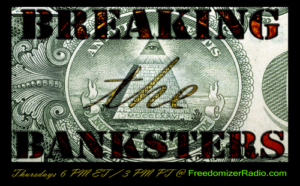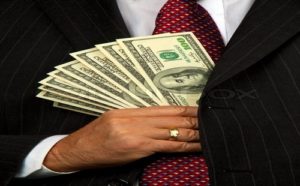Greed and a desire for riches are traps that bring ruin and destruction. “The love of money is a root of all kinds of evil,” and Christians are warned, “Do not put your trust in wealth” (see 1 Timothy 6:9-10, 17-18). Covetousness, or having an excessive or greedy desire for more, is idolatry. Ephesians 5:5 says, “For of this you can be sure: No immoral, impure or greedy person – such a man is an idolater – has any inheritance in the kingdom of Christ and of God.” The principle to remember is contained in Hebrews 13:5: “Keep your lives free from the love of money and be content with what you have, because God has said, ‘Never will I leave you; never will I forsake you.’” Source
Yesterday, every U.S. television network carried the New York Times bombshell that Deutsche Bank employees had flagged suspicious activity in the bank accounts of President Donald Trump and his son-in-law, Jared Kushner, involving foreign money flows, but their superiors at Deutsche Bank did not allow the reports to be filed with the Financial Crimes Enforcement Network (FinCEN), a unit of the U.S. Treasury that is mandated under law to receive and investigate such reports. From there the news went viral around the globe, landing on cable news, Reuters and in European newspapers. (Shortly after trading opened this morning on the New York Stock Exchange, Deutsche Bank’s stock traded at an all-time low of $7.39. This was a $120 stock in 2007.)
There is no disputing the fact that this is a critical development, for the following key reasons that we will address one by one.
First, Trump is Tweeting away this morning, bashing the New York Times’ report as “Fake News” and adding that “Fake Media” “uses unnamed sources (because their sources don’t even exist).” That retort has worked well for Trump in the past but it’s not going to fly this time around. The Times carries a photo of the Deutsche Bank whistleblower, Tammy McFadden, one of the five sources for their story. She is described as “a longtime anti-money laundering specialist in Deutsche Bank’s Jacksonville office,” who “found that money had moved from Kushner Companies to Russian individuals,” and “concluded that the transactions should be reported to the government — in part because federal regulators had ordered Deutsche Bank, which had been caught laundering billions of dollars for Russians, to toughen its scrutiny of potentially illegal transactions.”
McFadden then drafted a Suspicious Activity Report (SAR). McFadden and two other Deutsche Bank managers told the Times that the normal procedure was for the SAR to be “reviewed next by a team of anti-money laundering experts” who were independent of the business unit where the transaction originated. That didn’t happen. The very unit that had handled the transaction, the Private Bank, blocked the report from moving on to FinCEN, according to McFadden and her former colleagues. McFadden told the Times she was fired from Deutsche Bank last year after raising concerns about the bank’s money laundering practices.
This raises point number two. Deutsche Bank could be in very serious trouble over this issue. JPMorgan Chase was charged, and admitted to, two criminal felony counts on January 7, 2014 for failing to uphold the Bank Secrecy Act (BSA) and file a SAR with FinCEN. Those charges resulted from JPMorgan Chase’s failure to report highly suspicious activity in the business bank accounts it held for Bernie Madoff, in what turned out to be the largest Ponzi scheme in history. The Private Bank of JPMorgan Chase was also involved in this matter as billions of unexplained dollars were flowing back and forth between Madoff and a highly valued real estate client of JPMorgan’s Private Bank, Norman F. Levy.
After reading the documents released by the Justice Department on the day it announced the two felony counts against JPMorgan Chase, the Los Angeles Times asked in a photo caption of a smirking Madoff outside of Federal Court: “Bernie Madoff: Was he part of the JPMorgan ring, or was JPMorgan part of his ring?”
The same thing could be potentially asked here: Donald Trump: Is he part of the Deutsche Bank ring, or was Deutsche Bank part of his ring?”
Deutsche Bank settled with U.S. and U.K. authorities over a $10 billion Russian money laundering scheme in 2017, paying a combined fine of $630 million. Deutsche Bank’s offices in Frankfurt, Germany were raided in November of last year by 170 law enforcement officials. The probe involved potential money laundering. The draft report released by Democrats on the House Permanent Select Committee on Intelligence on March 13 of last year contained this paragraph:
“Donald Trump’s finances historically have been opaque, but there have long been credible allegations as to the use of Trump properties to launder money by Russian oligarchs, criminals, and regime cronies. There also remain critical unanswered questions about the source of President Trump’s personal and corporate financing. For example, Deutsche Bank, which was fined $630 million in 2017 over its involvement in a $10 billion Russian money-laundering scheme, consistently has been the source of financing for President Trump, his businesses, and his family. We have only begun to explore the relationship between President Trump and Deutsche Bank, and between the bank and Russia.”
Over the years, Deutsche Bank has loaned Trump “a total of well over $2 billion,” according to an earlier report in the New York Times. A significant part of that money was loaned when other major banks would not loan to Trump due to his defaults and business bankruptcies.
The current New York Times article has this to say about bank accounts directly involving Donald Trump:
“After Mr. Trump became president, transactions involving him and his companies were reviewed by an anti-financial crime team at the bank called the Special Investigations Unit. That team, based in Jacksonville, produced multiple suspicious activity reports involving different entities that Mr. Trump owned or controlled, according to three former Deutsche Bank employees who saw the reports in an internal computer system.
“Some of those reports involved Mr. Trump’s limited liability companies. At least one was related to transactions involving the Donald J. Trump Foundation, two employees said.
“Deutsche Bank ultimately chose not to file those suspicious activity reports with the Treasury Department, either, according to three former employees. They said it was unusual for the bank to reject a series of reports involving the same high-profile client.”
And now for point three: money laundering and Private Banking have a long, sordid history in the United States, thanks to the failure to prosecute and jail on the part of the U.S. Department of Justice.
In May 2017, the Justice Department announced that Banamex USA (BUSA), a unit of Citigroup, was being given a non-prosecution agreement and forfeiting $97.44 million. Banamex USA admitted to criminal violations for “willfully failing to file Suspicious Activity Reports (SARs).” The Justice Department found the following had occurred at Banamex USA:
“According to admissions contained in the NPA [non-prosecution agreement] and the accompanying statement of facts, from at least 2007 until at least 2012, BUSA processed more than 30 million remittance transactions to Mexico with a total value of more than $8.8 billion. During the same period, BUSA’s monitoring system issued more than 18,000 alerts involving more than $142 million in potentially suspicious remittance transactions. BUSA, however, conducted fewer than 10 investigations and filed only nine SARs in connection with these 18,000-plus alerts, filing no SARs on remittance transactions between 2010 and 2012.”
Conducting 10 investigations on 18,000 suspicious activity alerts sounds a lot like not wanting to rock the boat or catch the crooks – especially given the history of Citibank, the Federally-insured commercial bank that is part of Citigroup. As we previously reported:
In November 1999, the U.S. Senate’s Permanent Subcommittee on Investigations exposed the international money dealings at Citigroup’s commercial bank, Citibank. In his opening remarks, Senator Carl Levin explained how the bank operated:
“Today we are looking at the private bank of Citibank. It is the largest bank in the United States, and it has one of the largest private bank operations. It has the most extensive global presence of all U.S. banks, and it had a rogues’ gallery of private bank clients. Citibank has been private banker to:
“– Raul Salinas, brother to the former President of Mexico; now in prison in Mexico for murder and under investigation in Mexico for illicit enrichment; [Salinas had his murder conviction overturned on appeal and was released from prison in 2005.]
“– Asif Ali Zardari, husband to the former Prime Minister of Pakistan; now in prison in Pakistan for kickbacks and under indictment in Switzerland for money laundering;
“– Omar Bongo, President of Gabon; subject of a French criminal investigation into bribery;
“– sons of the General Sani Abacha, former military leader of Nigeria; one of whom is now in prison in Nigeria on charges of murder and under investigation in Switzerland and Nigeria for money laundering;
“– Jaime Lusinchi, former President of Venezuela; charged with misappropriation of government funds;
“– two daughters of Radon Suharto, former President of Indonesia, who has been alleged to have looted billions of dollars from Indonesia…
“– General Albert Stroessner, former President of Paraguay and notorious for decades for a dictatorship based on terror and profiteering.”
Robert L. Roach, Counsel to the Senate investigation, outlined during the hearing the services that Citibank had provided to Raul Salinas, brother to then President of Mexico, Carlos Salinas, as follows:
“The private bank…established a shell company for Mr. Salinas with layers of disguised ownership. It permitted a third party using an alias to deposit funds into the accounts, and it moved the funds out of Mexico through a Citibank concentration account that aided in the obfuscation of the audit trail. Cititrust in the Cayman Islands activated a Cayman Island shell corporation called a PIC, or private investment corporation, called Trocca, Ltd., to serve as the owner of record for the Salinas private bank accounts…
“Cititrust used three Panamanian shell companies to function as Trocca’s Board of Directors. Cititrust also used three Cayman Island shell companies to serve as Trocca’s officers and principal shareholders. Cititrust controls all six of these shell companies and routinely uses them to function as directors and officers of PICs that it makes available to private clients. Later, Citibank established a trust, identified only by a number, to serve as the owner of Trocca, Ltd. Raul Salinas was the secret beneficiary of the trust.
“The result of this elaborate structure was that the Salinas name did not appear anywhere on Trocca’s incorporation papers. The Trocca, Ltd. accounts were established in London and Switzerland…
“To accommodate Mr. Salinas’ desire to conceal the fact that he was moving money out of Mexico, Ms. [Amy] Elliott [a Relationship Manager at Citibank] introduced Mr. Salinas’ then-fiancee Paulina Castanon as Patricia Rios to a service officer at the Mexico City branch of Citibank. Operating under that alias, Ms. Castanon would deliver cashiers checks to the branch where they would be converted into dollars and wired into a concentration account in New York. The concentration account is a business account established by Citibank to hold funds from various destinations prior to depositing them into the proper accounts. Transferring funds through this account enables a client’s name and account number to be removed from the transaction, thereby clouding the audit trail. From there, the money would be transferred to the Trocca, Ltd. accounts in London and Switzerland…
“Between October 1992 and October 1994, more than $67 million was moved from Mexico to New York and then on to London and Switzerland by way of this system…Yet no one questioned Mr. Salinas about the origin of these funds. Far from inquiring about the sources of the funds, Ms. Elliott wrote to her colleagues in June 1993 that the Salinas account ‘is turning into an exciting, profitable one for us all. Many thanks for making me look good.’ ’’
Roach further expounded on how the Relationship Manager’s need to “please the client” trumped their responsibilities under the law, stating that “After Mr. Salinas was arrested, Hubertus Rukavina, the head of Citibank Private Bank at the time, suggested that the Salinas accounts in London be transferred back to Switzerland because they would be afforded more secrecy there.”
Amy Elliott, according to Roach, even advised Mrs. Salinas “that it might be wise to move the Trocca, Ltd. account out of Citibank because it might be more difficult for Mexican authorities to obtain account information from a non-U.S. bank.”
At one point during the hearing, Senator Levin questioned Amy Elliott on the transcript of a phone conversation she had with a colleague:
Senator Levin: “On another matter, the day after Mr. Salinas was arrested, you said the following: ‘Everybody was on board on this.’ Later, in the same conversation, you said, ‘I mean, this goes in the very, very top of the corporation this was known, Okay? On the very top.’ Then you said, ‘We are little pawns in this whole thing, Okay?’ Who were you referring to when you said ‘this goes in the very top of the corporation this was known’? Who are you referring to at the very top of the corporation”?
Amy Elliott: “Bill Rhodes…I am sitting four or five down from the chairman, and Bill Rhodes was and is the vice chairman of the bank. To me, that’s pretty top.”
It should be crystal clear that the U.S. Department of Justice can’t be in charge of this new investigation if America expects to ever extricate itself from this unprecedented era of corruption.Source
StevieRay Hansen
Editor, Bankster Crime
MY MISSION IS NOT TO CONVINCE YOU, ONLY TO INFORM…
#Fraud #Banks #Money #Corruption #Bankers
![]()




